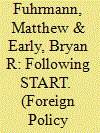|
|
|
Sort Order |
|
|
|
Items / Page
|
|
|
|
|
|
|
| Srl | Item |
| 1 |
ID:
081309


|
|
|
|
|
| Publication |
2008.
|
| Summary/Abstract |
In September 1991, U.S. President George H.W. Bush launched the Presidential Nuclear Initiatives (PNIs), which were unilateral measures that led to the largest reductions in the American and Soviet/Russian nuclear arsenals to date. Despite their eventual success, the United States took on significant risks in launching the PNIs. To uncover the best theoretical explanation for their onset, this article uses realism, neorealism, the bureaucratic politics model, expected utility theory, and prospect theory to generate ex ante predictions regarding nuclear arms control at the end of the Cold War. It then tests the theories' predictions against the empirical record. The results suggest that a focus on an individual decision maker-President Bush-is necessary to fully understand the PNIs and that an explanation rooted in prospect theory offers the most explanatory power. This study speaks to an important debate in discipline regarding the significance of individuals, while underscoring the value of exploring foreign policy decision making from multiple levels of analysis. It also advances the literatures on risk acceptance and prospect theory by shifting their applications away from militarized conflict and crises to diplomatic negotiations and cooperation
|
|
|
|
|
|
|
|
|
|
|
|
|
|
|
|
| 2 |
ID:
081310


|
|
|
|
|
| Publication |
2008.
|
| Summary/Abstract |
Regardless of the primary motive, international military intervention aimed at nation building is partly intended to establish democratic societies. And scholars have demonstrated that intervention does have a positive impact on democratization. With democratization generally follows greater support for human rights. Feminist scholars, however, have questioned definitions of democracy in which at minimal, women's political rights are absent. This brings into question the impact of intervention on the status of women. Particularly in both Iraq and Afghanistan women's rights have become prominent in the post-invasion American political rhetoric. Since intervention seems to be associated with the spread of democratic principles, we seek to discover whether intervention actually moves societies toward gender equality. We examine all six cases of completed military intervention aimed at nation building in sovereign states during the post Cold War period. Three of the cases-El Salvador, Mozambique, Namibia-evidence democratic change; whereas, the remaining three states-Cambodia, Haiti, Somalia-remain undemocratized. We test the extent to which intervention has or has not improved women's equality and find no dramatic effect, either positive or negative, of intervention on the status of women in any of the six states
|
|
|
|
|
|
|
|
|
|
|
|
|
|
|
|
| 3 |
ID:
081311


|
|
|
|
|
| Publication |
2008.
|
| Summary/Abstract |
Institutional constraints have been offered by some scholars as an explanation for why multiparty coalitions should be more peaceful than single-party cabinets. Yet others see the same institutional setting as a prescription for more aggressive behavior. Recent research has investigated these conflicting expectations, but with mixed results. We examine the theoretical bases for these alternative expectations about the effects of coalition politics on foreign policy. We find that previous research is limited theoretically by confounding institutional effects with policy positions, and empirically by analyzing only international conflict data. We address these limitations by examining cases of foreign policy behavior using the World Event/Interaction Survey (WEIS) dataset. Consistent with our observation that institutional constraints have been confounded with policy positions, we find that coalitions are neither more aggressive nor more peaceful, but do engage in more extreme foreign policy behaviors. These findings are discussed with regard to various perspectives on the role of institutions in shaping foreign policy behavior
|
|
|
|
|
|
|
|
|
|
|
|
|
|
|
|
| 4 |
ID:
081308


|
|
|
|
|
| Publication |
2008.
|
| Summary/Abstract |
The overarching question this paper addresses is whether and, if so, to what extent can existing IR theories commonly associated with high politics decision making be applied to low politics issue areas, specifically international environmental policy. The paper serves to test poliheuristic theory against two case studies, The Montreal Protocol and The Kyoto Protocol, to assess its ability to explain the decision-making processes of four United States presidents. The paper concludes that poliheuristic theory adequately explains the presidents' behavior in virtually all cases. It is especially effective in explaining the first phase of the decision-making process. The paper also suggests in the conclusion that a president's "environmentalness" may affect his decision-making behavior in the first phase.
|
|
|
|
|
|
|
|
|
|
|
|
|
|
|
|
|
|
|
|
|